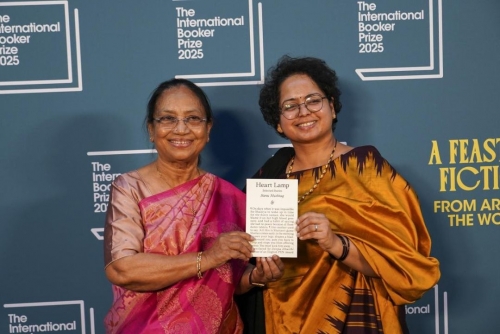Indian Writer Banu Mushtaq Makes History with International Booker Prize Win
TDT | Manama
Email: mail@newsofbahrain.com
Indian writer, lawyer, and activist Banu Mushtaq has made literary history by winning the International Booker Prize for her short story collection Heart Lamp. This marks the first time a work written in Kannada — a language spoken in the southern Indian state of Karnataka — has received this prestigious international award.
Heart Lamp features 12 short stories written by Mushtaq between 1990 and 2023. The stories, translated into English by Deepa Bhasthi, focus on the lives and struggles of Muslim women in southern India. In her acceptance speech, Mushtaq thanked her readers and spoke about the power of storytelling. “No story is ever small,” she said, emphasizing how literature helps us understand each other’s lives.
Deepa Bhasthi, who became the first Indian translator to win an International Booker, expressed hope that this achievement would inspire more translations of regional Indian languages like Kannada.
Mushtaq’s award comes after Geetanjali Shree’s Tomb of Sand (translated from Hindi) won the same prize in 2022. Although Mushtaq has long been respected in literary circles, this international recognition shines a brighter light on her career and the powerful themes she explores — especially the challenges faced by women in conservative and patriarchal societies.
Raised in a small Muslim neighborhood in Karnataka, Mushtaq studied the Qur’an in school but was later enrolled in a convent school by her father to ensure broader educational opportunities. She learned Kannada and began writing early, eventually choosing it as the language for her creative work.
Her writing career took off during a difficult time in her life. After marrying a man of her choice at age 26, Mushtaq faced domestic pressures and depression. She has openly discussed this period in interviews, including a moment of deep despair when she nearly attempted self-harm. That painful experience became a turning point in her life.
Her characters in Heart Lamp reflect this same spirit of resilience and resistance. According to a review in The Indian Express, “Mushtaq refuses to portray Muslim women as mere symbols. Her characters endure, push back, and find strength in everyday acts.”
Mushtaq has also worked as a journalist and later as a lawyer to support her family. She was involved in the Bandaya movement, a progressive literary movement addressing social justice.
Her outspoken views on women’s rights have not been without consequences. In 2000, she received threats — including a fatwa — after speaking in favor of women’s right to pray in mosques. She even survived a knife attack. But none of these challenges stopped her from writing.
“I’ve always challenged narrow-minded religious interpretations,” she said in an interview. “The core struggles for women and marginalized communities remain, even as the world changes.”
Mushtaq has authored six short story collections, a novel, and an essay collection. Her contributions have earned her several honors, including the Karnataka Sahitya Academy Award and the Daana Chintamani Attimabbe Award.
Earlier in 2024, the translated compilation Haseena and Other Stories — featuring works from 1990 to 2012 — won the PEN Translation Prize, further cementing her legacy as a powerful voice in Indian literature.
Related Posts

